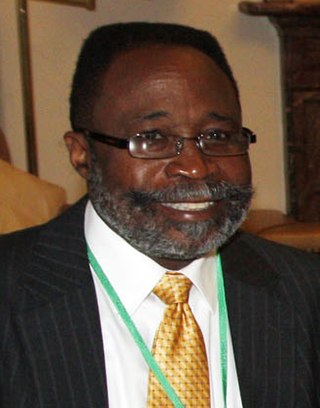
The economy of the British Virgin Islands is one of the most prosperous in the Caribbean. Although tiny in absolute terms, because of the very small population of the British Virgin Islands, in 2010 the Territory had the 19th highest GDP per capita in the world according to the CIA World factbook. In global terms the size of the Territory's GDP measured in terms of purchasing power is ranked as 215th out of a total of 229 countries. The economy of the Territory is based upon the "twin pillars" of financial services, which generates approximately 60% of government revenues, and tourism, which generates nearly all of the rest.
National health insurance (NHI), sometimes called statutory health insurance (SHI), is a system of health insurance that insures a national population against the costs of health care. It may be administered by the public sector, the private sector, or a combination of both. Funding mechanisms vary with the particular program and country. National or statutory health insurance does not equate to government-run or government-financed health care, but is usually established by national legislation. In some countries, such as Australia's Medicare system, the UK's National Health Service and South Korea's National Health Insurance Service, contributions to the system are made via general taxation and therefore are not optional even though use of the health system it finances is. In practice, most people paying for NHI will join it. Where an NHI involves a choice of multiple insurance funds, the rates of contributions may vary and the person has to choose which insurance fund to belong to.

Terrance B. Lettsome International Airport, previously known as Beef Island Airport, is the main airport serving the British Virgin Islands, a British overseas territory in the Caribbean. The airport serves as the gateway to just about all of the islands within the BVI. The airport is also a gateway for inter-Caribbean travelers headed to the nearby U.S. Virgin Islands. Many travellers fly into Beef Island, with the intention of taking a ferry to the other smaller British Virgin Islands. The airport is located on Beef Island, a small island off the main island of Tortola, to which it is connected by the Queen Elizabeth II Bridge.
Social security in India includes a variety of statutory insurances and social grant schemes bundled into a formerly complex and fragmented system run by the Indian government at the federal and the state level. The Directive Principles of State Policy, enshrined in Part IV of the Indian Constitution reflects that India is a welfare state. Food security to all Indians are guaranteed under the National Food Security Act, 2013 where the government provides highly subsidised food grains or a food security allowance to economically vulnerable people. The system has since been universalised with the passing of The Code on Social Security, 2020. These cover most of the Indian population with social protection in various situations in their lives.

Healthcare in Singapore is under the purview of the Ministry of Health of the Government of Singapore. It mainly consists of a government-run publicly funded universal healthcare system as well as a significant private healthcare sector. Financing of healthcare costs is done through a mixture of direct government subsidies, compulsory comprehensive savings, national healthcare insurance, and cost-sharing.

Healthcare in Taiwan is administered by the Ministry of Health and Welfare of the Executive Yuan. As with other developed economies, Taiwanese people are well-nourished but face such health problems as chronic obesity and heart disease. In 2002 Taiwan had nearly 1.6 physicians and 5.9 hospital beds per 1,000 population. In 2002, there were 36 hospitals and 2,601 clinics in the country. Per capita health expenditures totaled US$752 in 2000. Health expenditures constituted 5.8 percent of the gross domestic product (GDP) in 2001 ; 64.9 percent of the expenditures were from public funds. Overall life expectancy in 2019 was averaged at 81 years.

Healthcare in Ghana is mostly provided by the national government, and less than 5% of GDP is spent on healthcare. The healthcare system still has challenges with access, especially in rural areas not near hospitals.

Rashtriya Swasthya Bima Yojana is a government-run health insurance programme for the Indian poor. The scheme aims to provide health insurance coverage to the unrecognised sector workers belonging to the BPL category and their family members shall be beneficiaries under this scheme. It provides for cashless insurance for hospitalisation in public as well as private hospitals. The scheme started enrolling on April 1, 2008 and has been implemented in 25 states of India. A total of 36 million families have been enrolled as of February 2014. Initially, RSBY was a project under the Ministry of Labour and Employment. Now it has been transferred to Ministry of Health and Family Welfare from April 1, 2015
Examples of health care systems of the world, sorted by continent, are as follows.

Julian Fraser is a British Virgin Islander politician who formerly belonged to the opposition Virgin Islands Party in the British Virgin Islands, and in August 2018 formed a new party, Progressives United.

Healthcare in the British Virgin Islands is predominantly provided by private healthcare providers with an overlay of public support. There is a single public hospital in the British Virgin Islands - Peebles Hospital in Road Town on Tortola. There is also one private hospital - the Bougainvillea clinic. On Anegada, Virgin Gorda and Jost Van Dyke, there are day clinics to serve non-emergency medical needs of residents of those islands. Although there is periodic discussion about the possibility of building another hospital on Virgin Gorda, to date there has been no commitment to doing so. For emergency medical evacuations from other islands a boat is maintained.

Peebles Hospital is the main public hospital in the British Virgin Islands. The hospital is located in the capital, Road Town, on the island of Tortola. It was founded in 1922 by Major H.W. Peebles, and was originally known as the Cottage Hospital.

Andrew Alturo Fahie is a British Virgin Islands politician who served as Premier of the British Virgin Islands from 2019 to 2022. He was also the chairman of the Virgin Islands Party in the British Virgin Islands from 2016 to 2022. He was convicted of a range of charges relating to conspiracy to import cocaine into the United States in 2024.

Events from the year 2017 in the British Virgin Islands.

Events from the year 2016 in the British Virgin Islands.

The effects of Hurricane Irma in the British Virgin Islands were significant in terms of both human and socio-economic impact on the Territory. Hurricane Irma struck the British Virgin Islands as a Category 5 hurricane during the daylight hours of Wednesday, 6 September 2017. It caused widespread destruction, and killed a total of four people. The eye of the hurricane traveled over the three major islands in the group: Virgin Gorda, Tortola and Jost Van Dyke.
Events from the year 2019 in the British Virgin Islands.

The global viral pandemic of coronavirus disease 2019 (COVID-19) was confirmed to have reached the British Overseas Territory of the British Virgin Islands in March 2020.

Events from the year 2022 in the British Virgin Islands.














